- Home
- Neil Gaiman
Anansi Boys Page 34
Anansi Boys Read online
Page 34
Tiger padded as far back into the cave as it could easily walk. “You think I can’t wait?” he asked. “You have to come out sooner or later. I’m not going anywhere.” Tiger lay down. He closed his eyes and soon began to make fairly convincing snoring noises.
After about half an hour of snoring from Tiger, the pale animal crept out from the rocks and slipped from shadow to shadow, making for a large bone that still had plenty of good meat on it, if you didn’t mind a certain rankness, and it didn’t. Still, to get to the bone, it would have to pass the great beast. It lurked in the shadows, then it ventured out on little silent feet.
As it passed the sleeping Tiger, a forepaw shot out, and a claw slammed down on the creature’s tail, pinning it down. Another paw held the little creature behind the neck. The great cat opened its eyes. “Frankly,” it said, “we appear to be stuck with each other. So all I’m asking is that you make an effort. We can both make an effort. I rather doubt that we’ll ever be friends, but perhaps we could learn to tolerate each other.”
“I take your point,” said the small ferretty thing. “Needs must, as they say, when the Devil drives.”
“That’s an example of what I’m saying,” said Tiger. “You just have to learn when to keep your mouth shut.”
“It’s an ill wind,” said the little animal, “that blows nobody any good.”
“Now you’re irritating me again,” said Tiger. “I’m trying to tell you. Don’t irritate me, and I won’t bite off your head.”
“You keep using the phrase ‘bite my head off.’ Now when you say ‘bite my head off,’ I take it I can assume that this is actually some kind of metaphorical statement, implying that you’ll shout at me, perhaps rather angrily?”
“Bite your head off. Then crunch it. Then chew it. Then swallow it,” said Tiger. “Neither of us can leave until Anansi’s child forgets we’re here. The way that bastard seems to have arranged things, even if I kill you in the morning you’ll be reincarnated back in this blasted cave by the end of the afternoon. So don’t irritate me.”
The small white animal said, “Ah well. Another day—”
“If you say ‘another dollar,’” said Tiger, “I will be irritated, and there will be serious consequences. Don’t. Say anything. Irritating. Do you understand?”
There was a brief silence in the cave at the end of the world. It was broken by a small, weasely voice saying, “Absatively.”
It started to say, “Oww!” but the noise was suddenly and effectively silenced.
And then there was nothing in that place but the sound of crunching.
THE THING THEY DON’T TELL YOU ABOUT COFFINS IN THE LITERATURE, because frankly it’s not much of a selling point to the people who are buying them, is just how comfortable they are.
Mr. Nancy was extremely satisfied with his coffin. Now that all the excitement was over, he’d gone back to his coffin and was comfortably dozing. Every once in a while he would wake and remember where he was, then he’d roll over and go back to sleep.
The grave, as has been pointed out, is a fine place, not to mention a private one, and is thus an excellent place to get a little downtime. Six feet down, best kind there is. Another twenty years or so, he thought, and he would have to think about getting up.
He opened one eye when the funeral started.
He could hear them up above him: Callyanne Higgler and the Bustamonte woman and the other one, the thin one, not to mention a small horde of grandchildren, great-grandchildren, and great-great grandchildren, all of them sighing and wailing and crying their eyes out for the late Mrs. Dunwiddy.
Mr. Nancy thought about pushing one hand up through the turf and grabbing Callyanne Higgler’s ankle. It was something he’d wanted to do ever since he saw Carrie at a drive-in, thirty years earlier, but now that the opportunity presented itself, he found himself able to resist the temptation. Honestly, he couldn’t be bothered. She’d only scream and have a heart attack and die, and then the damn Garden of Rest would get even more crowded than it already was.
Too much like hard work, anyway. There were good dreams to be dreamed in the world beneath the soil. Twenty years, he thought. Maybe twenty-five. By that time, he might even have grandchildren. It’s always interesting to see how the grandchildren turn out.
He could hear Callyanne Higgler wailing and carrying on up above him. Then she stopped her sobbing long enough to announce, “Still. It’s not as if she don’t have a good life and a long one. That woman’s a hundred and three years old when she passes from us.”
“Hunnert and four!” said an irritated voice from under the ground beside him.
Mr. Nancy reached one insubstantial arm out and tapped the new coffin sharply on the side. “Keep it down, there, woman,” he barked. “Some of us is tryin‘ to sleep.”
ROSIE HAD MADE IT CLEAR TO SPIDER THAT SHE EXPECTED him to get a steady job, the kind that involved getting up in the morning and going somewhere.
So one morning, the day before Rosie was to be discharged from the hospital, Spider got up early and went down to the town library. He logged on to the library computer, sauntered onto the Internet and, very carefully, cleared out all Grahame Coats’s remaining bank accounts, the ones that the police forces of several continents had so far failed to find. He arranged for the stud farm in Argentina to be sold. He bought a small, off-the-peg company, endowed it with the money, and applied for charitable status. He sent off an e-mail, in the name of Roger Bronstein, hiring a lawyer to administer the foundation’s business, and suggested that the lawyer might wish to seek out Miss Rosie Noah, late of London, currently of Saint Andrews, and hire her to Do Good.
Rosie was hired. Her first task was to find office space.
Following this, Spider spent four full days walking (and, at nights, sleeping on) the beach that circled most of the island, tasting the food in each of the dining establishments he encountered along the way until he came to Dawson’s Fish Shack. He tried the fried flying fish, the boiled green figs, the grilled chicken, and the coconut pie, then he went back into the kitchen and found the chef, who was also the owner, and offered him money enough for partnership and cooking lessons.
Dawson’s Fish Shack is now a restaurant, and Mr. Dawson has retired. Sometimes Spider’s out front and sometimes he’s back in the kitchen: you go down there and look for him, you’ll see him. The food is the best on the island. He’s fatter than he used to be, though not as fat as he’ll wind up if he keeps tasting everything he cooks.
Not that Rosie minds.
She does some teaching, and some helping out, and a lot of Doing Good, and if she ever misses London she never lets it show. Rosie’s mother, on the other hand, misses London continually and vocally, but takes any suggestion that she might want to return there as an attempt to part her from her as-yet-unborn (and, for that matter, unconceived) grandchildren.
Nothing would give this author greater pleasure than to be able to assure you that, following her return from the valley of the shadow of death, Rosie’s mother became a new person, a jolly woman with a kind word for everyone, that her newfound appetite for food was only matched by her appetite for life and all if had to offer. Alas, respect for the truth compels perfect honesty and the truth is that when she came out of hospital Rosie’s mother was still herself, just as suspicious and uncharitable as ever, although significantly more frail and now given to sleeping with the light on.
She announced that she would be selling her flat in London and would move to wherever in the world Spider and Rosie were, to be near her grandchildren; and, as time went on, she would drop pointed comments about the lack of grandchildren, the quantity and motility of Spider’s spermatozoa, the frequency and positions of Spider and Rosie’s sexual relations, and the relative cheapness and ease of in vitro fertilization, to the point where Spider seriously began to think about not going to bed with Rosie anymore, just to spite Rosie’s mother. He thought about this for about eleven seconds one afternoon, while Rosie’s mother was
handing them photocopies of an article from a magazine that she had found which suggested that Rosie should stand on her head for half an hour after sex; and he mentioned these thoughts to Rosie that night, and she laughed and told him that her mother wasn’t allowed in their bedroom anyway, and that she wasn’t going to be standing on her head after making love for anybody.
Mrs. Noah has a flat in Williamstown, near Spider and Rosie’s house, and twice a week one of Callyanne Higgler’s many nieces looks in on her, does the vacuuming, dusts the glass fruit (the wax fruit melted in the island heat), and makes a little food and leaves it in the fridge, and sometimes Rosie’s mum eats it and sometimes she doesn’t.
CHARLIE’S A SINGER THESE DAYS. HE’S LOST A LOT OF THE softness. He’s a lean man now, with a trademark fedora hat. He has lots of different fedoras, in different colors; his favorite one is green.
Charlie has a son. His name is Marcus: he is four and a half and possesses that deep gravity and seriousness that only small children and mountain gorillas have ever been able to master.
Nobody ever calls Charlie “Fat Charlie” anymore, and honestly, sometimes he misses it.
It was early in the morning in the summer, and it was already light. There was already noise coming from the room next door. Charlie let Daisy sleep. He climbed out of bed quietly, grabbed a T-shirt and shorts, and went through the door to see his son naked on the floor playing with a small wooden train set. Together they pulled on their T-shirts and shorts and flip-flops, and Charlie put on a hat, and they walked down to the beach.
“Daddy?” said the boy. His jaw was set, and he seemed to be pondering something.
“Yes, Marcus?”
“Who was the shortest president?”
“You mean in height?”
“No. In, in days. Who was the shortest.”
“Harrison. He caught pneumonia during his inauguration and died. He was president for forty-something days, and he spent most of his time in office dying.”
“Oh. Well, who was the longest then?”
“Franklin Delano Roosevelt. He served three full terms. Died in office during his fourth. We’ll take off our shoes here.”
They placed their shoes on a rock and carried on walking down toward the waves, their toes digging into the damp sand.
“How do you know so much about presidents?”
“Because my father thought it would do me good to find out about them, when I was a kid.”
“Oh.”
They waded out into the water, making for a boulder, one that could only be seen at low tide. After a while, Charlie picked the boy up and let him ride on his shoulders.
“Daddy?”
“Yes, Marcus.”
“P’choona says you’re famous.”
“And who’s Petunia?”
“At playgroup. She says her mom has all your CDs. She says she loves your singing.”
“Ah.”
“Are you famous?”
“Not really. A little bit.” He put Marcus down on the top of the boulder, then he clambered up it himself. “Okay. Ready to sing?”
“Yes.”
“What do you want to sing?”
“My favorite song.”
“I don’t know if she’ll like that one.”
“She will.” Marcus had the certainty of walls, of mountains.
“Okay. One, two, three…”
They sang “Yellow Bird” together, which was Marcus’s favorite song that week, and then they sang “Zombie Jamboree,” which was his second favorite, and “She’ll Be Coming Round the Mountain,” which was his third favorite. Marcus, whose eyes were better than Charlie’s, spotted her as they were finishing “She’ll Be Coming Round the Mountain” and he began to wave.
“There she is, Daddy.”
“Are you sure?”
The morning haze blurred the sea and sky together into a pale whiteness, and Charlie squinted at the horizon. “I don’t see anything.”
“She’s gone under the water. She’ll be here soon.”
There was a splash, and she surfaced immediately below them; with a reach and a flip and a wiggle she was sitting on the rock beside them, her silvery tail dangling down into the Atlantic, flicking beads of water up onto her scales. She had long, orange-red hair.
They all sang together now, the man and the boy and the mermaid. They sang “The Lady Is a Tramp” and “Yellow Submarine” and then Marcus taught the mermaid the words to the Flintstones theme song.
“He reminds me of you,” she said to Charlie, “when you were a little boy.”
“You knew me then?”
She smiled. “You and your father used to walk down the beach, back then. Your father,” she said. “He was quite some gentleman.” She sighed. Mermaids sigh better than anyone. Then she said, “You should go back now. The tide’s coming in.” She pushed her long hair back and jackknifed into the ocean. She raised her head above the waves, touched her fingertips to her lips, and blew Marcus a kiss before vanishing under the water.
Charlie put his son onto his shoulders, and he waded through the sea, back to the beach, where his son slipped down from his shoulders onto the sand. He took off his old fedora hat and placed it on his son’s head. It was much too big for the boy, but it still made him smile.
“Hey,” said Charlie, “You want to see something?”
“Okay. But I want breakfast. I want pancakes. No, I want oatmeal. No, I want pancakes.”
“Watch this.” Charlie began to do a sand-dance in his bare feet, soft-shoe shuffling through the sand.
“I can do that,” said Marcus.
“Really?”
“Watch me, Daddy.”
He could, too.
Together the man and the boy danced their way back up the sand to the house, singing a wordless song that they made up as they went along, which lingered in the air even after they had gone in for breakfast.
ACKNOWLEDGMENTS
To begin with, an enormous bunch of flowers to Nalo Hopkinson, who kept a helpful eye on the Caribbean dialogue and not only told me what I needed to fix but suggested ways to fix it; and also to Lenworth Henry, who was there on the day I made it all up, and whose voice I heard in the back of my head when I was writing it (which is why I was delighted to hear that he would be narrating the audio book).
As with my last adult novel, American Gods, I was given two bolt-holes while I was writing this novel. I started writing it in Tori’s spare house in Ireland, and I finished it there as well. She is a most gracious hostess. At one point in the middle, hurricanes permitting, I worked in Jonathan and Jane’s spare house in Florida. It’s a good thing to have friends with more houses than they have bodies, especially if they’re happy to share. Most of the rest of the time I wrote in the local coffee house, and drank cup after cup of terrible tea in a rather pathetic demonstration of hope over experience.
Roger Forsdick and Graeme Baker gave up their time to answer my questions about the police, and fraud, and extradition treaties, while Roger also showed me around the cells, fed me dinner, and looked over the finished manuscript. I’m very grateful.
Sharon Stiteler kept an eye on the book to make sure the birds passed muster and she answered my birding questions. Pam Noles was the first person to read any of the book, and her responses kept me going. There was a small host of other people who lent me their eyes and minds and opinions, including Olga Nunes, Colin Greenland, Giorgia Grilli, Anne Bobby, Peter Straub, John M. Ford, Anne Murphy and Paul Kinkaid, Bill Stiteler, and Dan and Michael Johnson. Errors of fact or of opinion are mine, not theirs.
Thanks also go to Ellie Wylie; Thea Gilmore; The Ladies of Lakeside; to Miss Holly Gaiman, who turned up to help whenever she decided I needed a sensible daughter around; to the Petes of Hill House, Publishers; to Michael Morrison, Lisa Gallagher, Jack Womack, and Julia Bannon; and to Dave McKean.
Jennifer Brehl, my editor at Morrow, was the person who persuaded me that the story I told her over lunch that day really woul
d make a good novel, at a time when I really wasn’t sure what the next novel was going to be, and she sat patiently when I phoned her up one night and read her the first third of the book. For these things alone she should be sainted. Jane Morpeth at Headline is the kind of editor writers hope to get if they’re very good and eat all their vegetables. Merrilee Heifetz at Writers House, with the assistance of Ginger Clark, and, in the U.K., Dorie Simmonds, are my literary agents. I’m lucky to have them all on my side, and I know just how lucky I am.
Jon Levin keeps the world of movies running for me. My assistant, Lorraine, helped keep me writing and made really good cups of tea.
I don’t think I could have written Fat Charlie without having had both an excellent but embarrassing father and wonderful but embarrassed children. Hurrah for families.
And a final thank you to something that didn’t exist when I wrote American Gods: to the readers of the journal at www.neilgaiman.com, who were always there whenever I needed to know anything, and who, between them all, as far as I can tell, know everything there is to be known.
—Neil Gaiman,
June 2005
E-BOOK EXTRA ONE
THE ADVENTURES OF SPIDER (A DELETED SCENE)
By Neil Gaiman
Think of this as being one of those odd scenes that normally turn up as extras on DVDs—the scenes that everyone liked, but that made the film work better without them. It’s one of them.
I really enjoyed writing it, and my editor at Headline, the redoubtable Jane Morpeth, was sad when I told her it was going, because she liked it. And for that matter, I liked it too, only it messed up the pacing of the chapter it was in, and once I was prepared to grit my teeth and cut it, everything worked rather better.

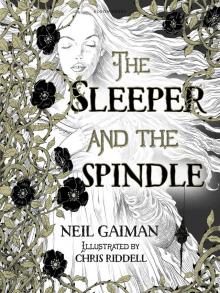 The Sleeper and the Spindle
The Sleeper and the Spindle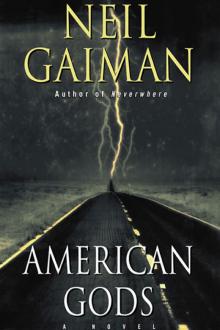 American Gods
American Gods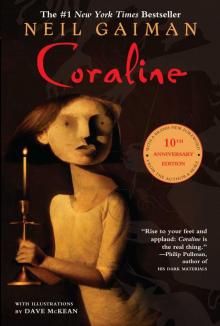 Coraline
Coraline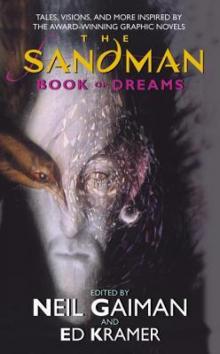 The Sandman: Book of Dreams
The Sandman: Book of Dreams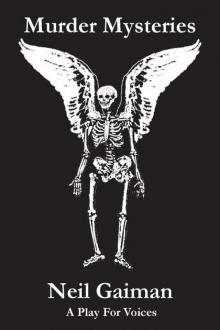 Murder Mysteries
Murder Mysteries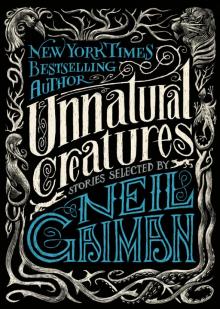 Unnatural Creatures
Unnatural Creatures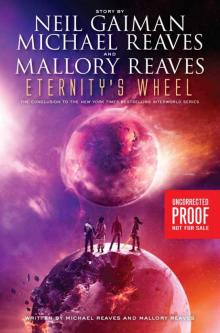 Eternity's Wheel
Eternity's Wheel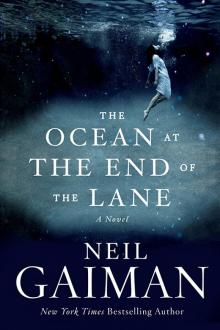 The Ocean at the End of the Lane
The Ocean at the End of the Lane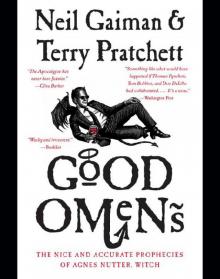 Good Omens
Good Omens Stardust
Stardust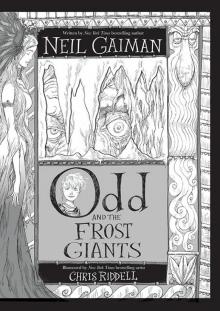 Odd and the Frost Giants
Odd and the Frost Giants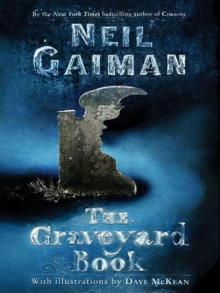 The Graveyard Book
The Graveyard Book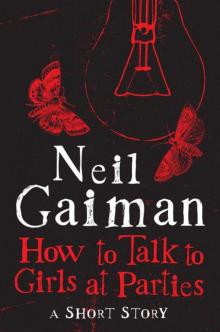 How to Talk to Girls at Parties
How to Talk to Girls at Parties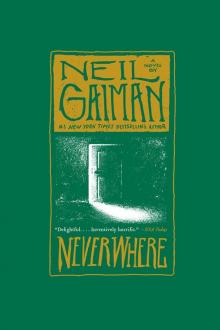 Neverwhere
Neverwhere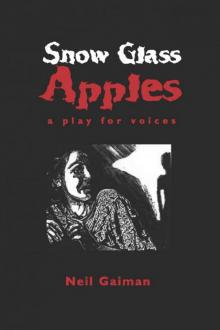 Snow, Glass, Apples
Snow, Glass, Apples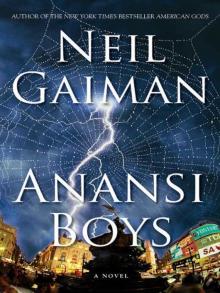 Anansi Boys
Anansi Boys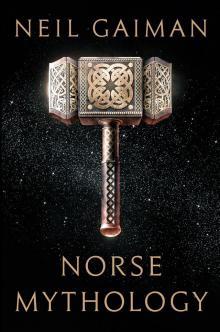 Norse Mythology
Norse Mythology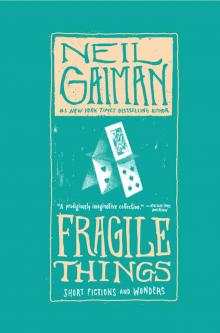 Fragile Things: Short Fictions and Wonders
Fragile Things: Short Fictions and Wonders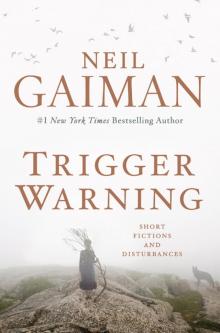 Trigger Warning: Short Fictions and Disturbances
Trigger Warning: Short Fictions and Disturbances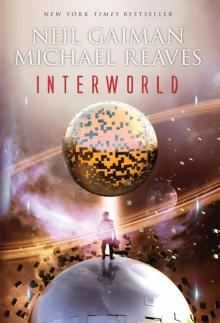 InterWorld
InterWorld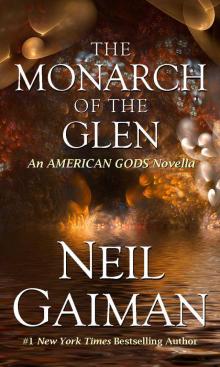 The Monarch of the Glen
The Monarch of the Glen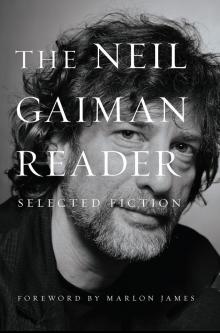 The Neil Gaiman Reader
The Neil Gaiman Reader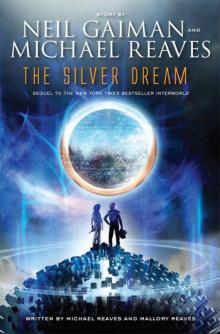 The Silver Dream
The Silver Dream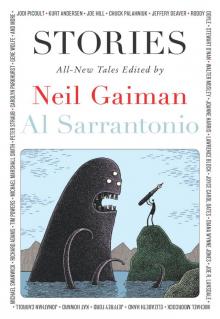 Stories
Stories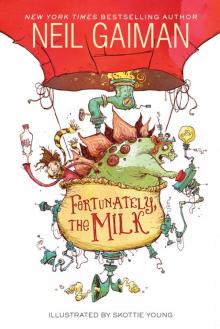 Fortunately, the Milk
Fortunately, the Milk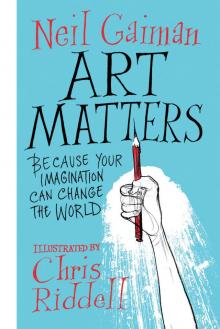 Art Matters
Art Matters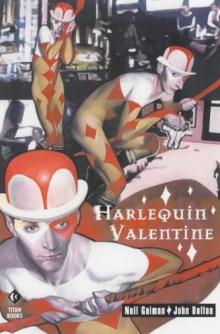 Harlequin Valentine
Harlequin Valentine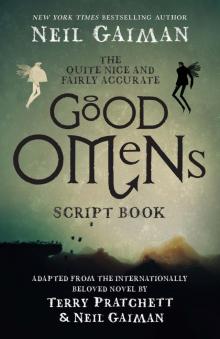 The Quite Nice and Fairly Accurate Good Omens Script Book
The Quite Nice and Fairly Accurate Good Omens Script Book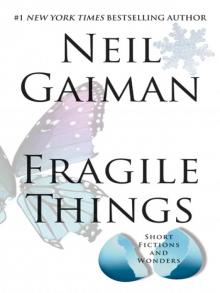 Fragile Things
Fragile Things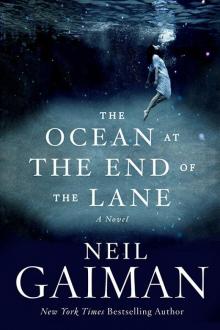 The Ocean at the End of the Lane: A Novel
The Ocean at the End of the Lane: A Novel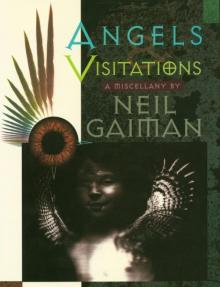 Angels and Visitations
Angels and Visitations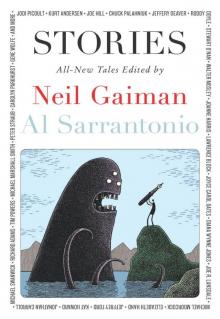 Stories: All-New Tales ngss-1
Stories: All-New Tales ngss-1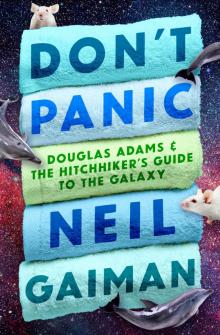 Don't Panic
Don't Panic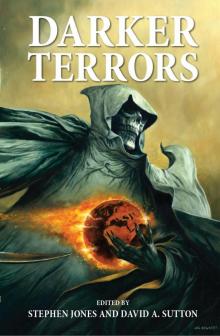 Darker Terrors
Darker Terrors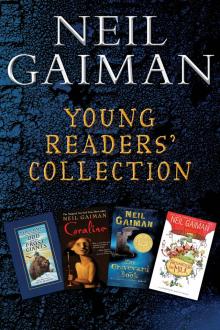 Neil Gaiman Young Readers' Collection
Neil Gaiman Young Readers' Collection A Study In Emerald
A Study In Emerald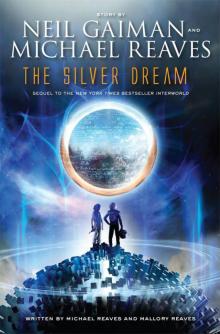 The Silver Dream: An InterWorld Novel
The Silver Dream: An InterWorld Novel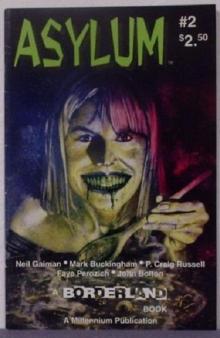 Feeders and Eaters
Feeders and Eaters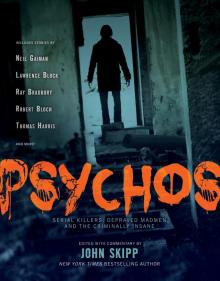 Psychos
Psychos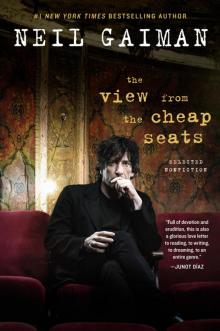 The View from the Cheap Seats
The View from the Cheap Seats Trigger Warning
Trigger Warning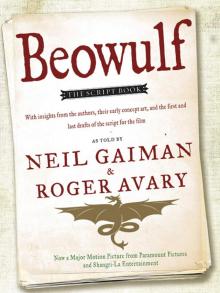 Beowulf
Beowulf Nessun Dove
Nessun Dove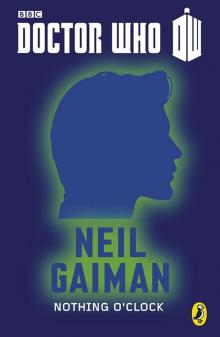 Doctor Who: Nothing O'Clock: Eleventh Doctor: 50th Anniversary
Doctor Who: Nothing O'Clock: Eleventh Doctor: 50th Anniversary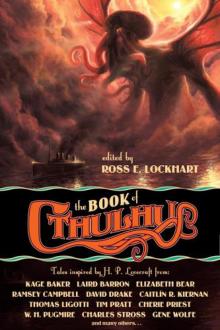 The Book of Cthulhu
The Book of Cthulhu